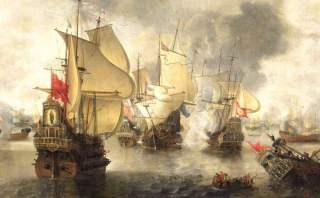The Triumph of Geopolitics
Amoral geopolitics, more than any clash of civilizations, dictated Venetian-Ottoman relations.
AND BECAUSE it all does so undeniably come alive, it forces reflection on our own world. We—especially the knowledge and policy elite among us—inhabit a cosmopolitan milieu that should make the Brunis and Brutis quite familiar to us. Anyone who has experienced the upper reaches of London, Washington, New York, Berlin, Shanghai and innumerable other cities, or has experienced the fancy and influential conference circuit, is aware of people of the most exotic parentage with extraordinary multilingual gifts and eclectic loyalties. This is a world of, for instance, someone born in Singapore, whose parents come from France and the Punjab, who may speak English, French, Chinese and Hindi, and has at least two passports, with relatives serving in multiple governments and nongovernmental organizations at reasonably high levels. This is the world of a former narrow and aristocratic elite morphing into a larger global upper class, one full of opportunities and risks: somewhat akin to that of the Brunis and Brutis.
It is also a world of Dubrovniks: that is, of transactional city-states—think of Singapore and Dubai—whose loyalty, deep down, is to business and trade rather than to any larger power per se. And, of course, it is a world of secular geopolitics that increasingly transcend religious divides: Israel and Saudi Arabia in a very real, albeit unspoken, alliance against Iran; former enemies America and Vietnam lining up against China; largely Eastern Orthodox Romania tilting away from Orthodox Russia while Orthodox Bulgaria and Serbia tilt increasingly toward Moscow. Divisions of religion and sect obviously cannot be denied, just as they could not be in the early modern world, but, as in that world, the closer you look the more the cross-cutting complexities and contradictions abound.
Finally, at a more profound and yet, perhaps, less obvious level, there is, as the French philosopher Pierre Manent intimates in Metamorphoses of the City, a growing emphasis on city-states and the half-hidden traditions of empire, even while the problems of modern states increase. I mean that powers such as the United States, China, Iran and the European Union, while not officially empires, have many of the frustrations and challenges of former imperiums—both successful ones and not. Meanwhile, on almost all continents cities grow into both megacities and region-states of their own.
Isn’t this all, then, to a much more amplified and enlarged, high-tech extent, a version of early modernism? Just as the young Henry Kissinger saw an answer to the possibility of nuclear conflict in the 1950s by concentrating on the post-Napoleonic court diplomacy of Metternich and Castlereagh, Noel Malcolm’s answer to where so-called postmodernism is heading is to concentrate on the early modern exploits of an extended, multinational family amid a world that is rather more multicultural than we may realize.
Robert D. Kaplan is the author most recently of In Europe’s Shadow: Two Cold Wars and a Thirty-Year Journey Through Romania and Beyond. He is a senior fellow at the Center for a New American Security.
Image: “Battle of the combined Venetian and Dutch fleets against the Turks in the Bay of Foya, 1649.” Public domain.

